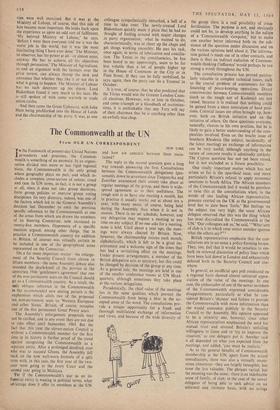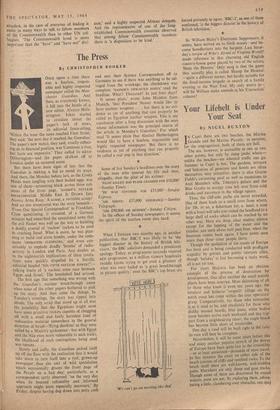The Commonwealth at the UN
From OUR UN CORRESPONDENT
NEW YORK
TN the framework of present-day United Nations 'procedures and practices, 'the Common- wealth is something of an anomaly. In an organi- sation divided into more or less rigid regional blocs, the Commonwealth is the only group where geography plays no part, and which in- cludes a complete cross-section of colour, creed and race. In UN terms, in fact, it is not a group at all, since it does not take group decisions, form group policies or exercise• group voting disciplines. Its very diversity, indeed, was one of the factors which led to the General Assembly's decision last December to omit the previous specific reference to the Commonwealth as one of the areas from which are drawn the members of its Steering Committee, now increased to twenty-five members. Opponents of a specific mention argued, among other things, that in practice a Commonwealth country (in addition to Britain, of course) was virtually certain to be included in one of the geographical areas represented on the Committee. •
On a far more important matter—the enlarge- ment of the Security Council from eleven to fifteen members—the same Assembly debate also sounded the death-knell of the proviso in the unwritten 1946 'gentlemen's agreement' that one of the non-permanent seats on the Council should go to a Commonwealth country. As a result, the only oblique reference to the Commonwealth in the recommended new seating pattern is the euphemism which allots two of the proposed ten non-permanent seats to 'Western European and other States.' Britain, of course, occupies one of the five permanent Great Power seats.
The Assembly's enlargement proposals may not be ratified, and in any event they are not due to take effect until September, 1965. But the fact that this year the eleven-nation Council is without a Commonwealth member for the first time in its history is further proof of the trend against recognising the Commonwealth as a separate entity. After a prolonged deadlock over who was to succeed Ghana, the Assembly fell back on the now well-worn formula of a split term with, in this case, the first year of the two- year term going to the Ivory Coast and the iecond year going to Malaysia.
Yet if the Commonwealth's star as an in- fluential entity is waning in political terms, what Advantage does it offer its members at the UN and how tained?
The reply to the second question goes a long way towards answering the first. Consultations between the Commonwealth delegations (pre- sumably down to seventeen since Tanganyika and Zanzibar announced their union) take place at regular meetings of the group, and there is wide- spread agreement as to their usefulness. The rough aim is to have one meeting a month, but in practice it usually works out at about ten a year, with many more, of course, being held during the Assembly than when it is not in session. There is no set schedule, however, and any delegation may request a meeting at any time on any subject. If no one asks for a meeting, none is held. Until about a year ago, the meet- ings were always chaired by Britain. Now, however, the chairmanship rotates each month, alphabetically, which is felt to be a great im- provement and a welcome sign of the times that has had a revitalising effect on the meetings. Under present arrangements, a member of the British delegation acts as secretary, but this could be changed by decision of the group at any time. As a general rule, the meetings are held in one of the smaller conference rooms at UN Head- quarters, although sometimes they take place at the-various delegations.
Paradoxically, the chief value of the meetings lies in the same qualities which prevent the Commonwealth from being a bloc in the ac- cepted sense of the word. The consultations pro- vide a unique opportunity for a frank and thorough multilateral exchange of information and views, and because of the wide diversity of are contacts between them main- the group there is a real possibility of cross- fertilisation. The purpose is not, and obviously could not be, to develop anything in the nature of a 'Commonwealth viewpoint,' but to make one another better informed both on the sub- stance of the question under discussion and on the various opinions held about it. The informa- tion gained is made use of in other contacts, and there is thus an indirect radiation of Common- wealth thinking (influence' would perhaps be too strong a word) throughout the UN.
The consultation process has proved particu- larly valuable in complex technical issues, such as the crucial problem of assessments for the financing of peace-keeping operations. Direct controversies between Commonwealth members (such as the tough nut of Kashmir) are not raised, because it is realised that nothing could be gained from a mere reiteration of hard posi- tions. Colonial issues are often brought up, how- ever, both on British initiative and on the initiative of others. On these questions everyone, naturally, cleaves to his own position, but he is likely to gain a better understanding of the com- plexities involved. Even on the touchy issue of Southern Rhodesia (the subject, incidentally, of the latest meeting) an exchange of information can be very useful, although anything in the nature of concrete results is admittedly unlikely. The Cyprus question has not yet been raised, but is not excluded as a future possibility.
One vitally important matter which has not arisen so far is the apartheid issue, and more particularly Britain's refusal to apply economic sanctions to South Africa. The African members of the Commonwealth feel it would be pointless to raise this at the consultations when, in the words of one leading African representative, pressure exerted on the UK at the governmental level has to date been 'futile.' But feelings on the subject run very high; the same African delegate observed that this was the thing 'wh,ich has most discredited the Commonwealth at the UN.' Our colleagues ask us,' he said, "What sort of club is it in which your senior member ignores what the others say?"'
British representatives emphasise that the cont- sultations are in no sense a policy-forming forum. They, too, feel that it would be senseless to em- bark on renewed discussion of policy lines which have been laid dowic in London and exhaustively debated both in the Security Council and else- where.
In general, an unofficial spot poll conducted on a regional basis showed almost universal appre- ciation of the value of the meetings. In one case, the ambassador of one of the newer members of the Commonwealth expressed considerable disappointment, particularly at what he con- sidered Britain's 'shyness' and failure to provide the Commonwealth with more information than she would announce publicly in the Security Council or the •Assembly. His opinion appeared to be a minority one, however, since other African representatives emphasised the need for mutual trust and stressed Britain's unfailing willingness to listen and to 'try to improve the ,ituation,' as one delegate put it. Another said it all depended on what you expected from the meetings, and added, 'you must be realistic.'
As to the general benefits of Commonwealth membership at the UN, apart from the actual consultations; there was also a virtually unani- mous consensus—they are largely intangible, but none the less valuable. The phrases varied, but the meaning was the same: there is an indefinable sense of family, of club; in the case of the newer delegates of being able to seek advice on an informal and intimate basis, with no strings attached; in the case of everyone of finding it easier in many ways to talk to fellow members of the Commonwealth than to other UN col- leagues. The Commonwealth bond is more Important than the "have" and "have not" divi- sion,' said a highly respected African delegate. And the representative of one of the long- established Commonwealth countries observed that among fellow Commonwealth members there is 'a disposition to be kind.'































 Previous page
Previous page